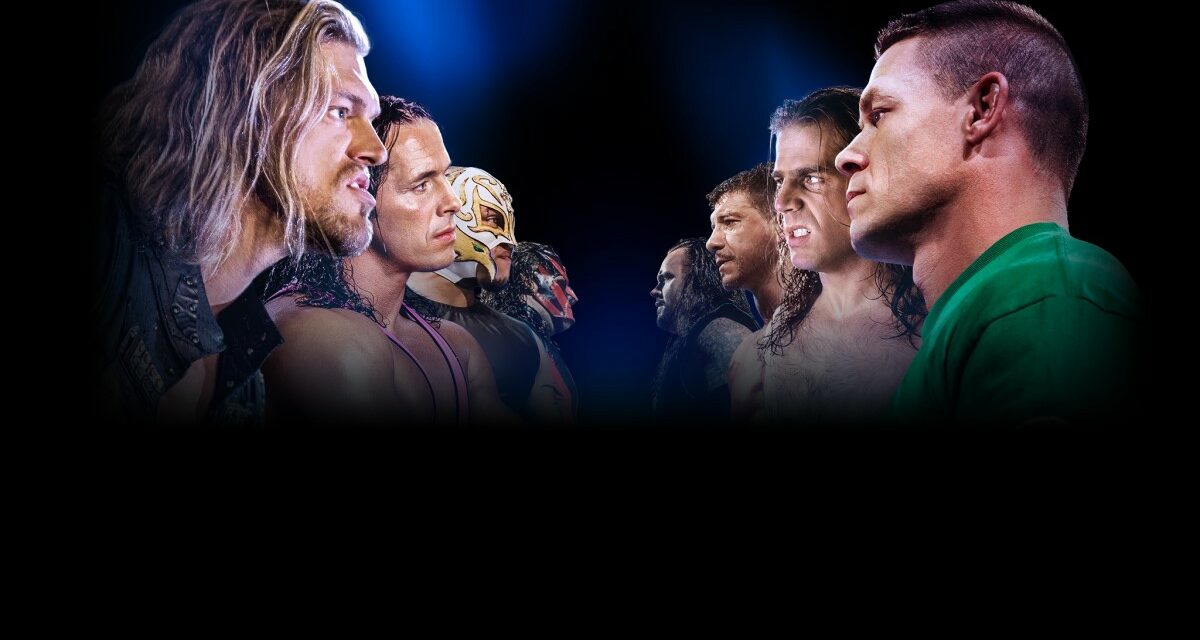Following the DX-focused episode of Biography, the Freddie Prinze, Jr.-hosted Rivals continues the tale of Triple H into his post-degenerate years as he feuded with Mick Foley. Sure, Foley got a lot of attention for bringing “three faces” to the party as Dude Love, Mankind, and Cactus Jack — but here was Triple H working on his own incarnations through the blue-blood snob, to the juvenile frat-boy, and eventually The Game, and both were looking to help each other make their mark.
As is custom, the show spends a few minutes setting the stage for both wrestlers’ careers and how they made their mark in the-then WWF. There has been a shake-up at the experts’ table, as Cody Rhodes and Beth Pheonix join Kevin Nash, JBL, and Prinze, Jr. to offer their thoughts. Rhodes recalls Foley’s lengthy sit-down interview with Jim Ross on Raw, ostensibly as Mankind but really opening the door to his true self, as Mick’s true moment of arrival. Foley himself says that interview was possibly his finest work.
Phoenix remembers watching that home footage of Foley jumping off of a roof (in the ultimate antithesis of the WWE’s “Don’t try this at home” mantra from later years), and knowing herself and other wrestling fans doing the same thing — except off of couches.
1997’s King of the Ring tournament is the starting point of this particular rivalry when Hunter Hearst Helmsley took the crown in the finals versus Mankind and they continued to feud afterwards. Foley speaks of his organic face turn thanks to his interview with Ross and feud with Helmsley, marking the 1997 SummerSlam steel cage match as the moment that Mick Foley truly emerged as his own, highly sympathetic character.
As Mankind was about to win the cage match, he saw his opportunity to recreate Jimmy Snuka’s splash off the top of the cage that had infatuated Foley as a teenager. He lands an elbow and still wins the match, signifying, according to Triple H, the end of their feud.
Then, out comes Dude Love, followed soon afterwards by Cactus Jack, and the rivalry is destined to continue. Mankind wins the WWE Championship, skipping over the part where Triple H and DX are in his corner for the match, and on the other side of that Triple age emerges from the faction to fight Foley for the title, taking it from him in August of 1999.
As much as the show highlighted how Mick Foley reached a pinnacle in his victories over Helmsley, the focus now shifts to Foley returning the favour and ushering in the dominance of Triple H. They fight at the 2000 Royal Rumble, with Triple H coming out on top and Foley contemplating retirement. This leads to a 2000 No Way Out encounter inside Hell in a Cell for the title, with Foley’s career on the line as well.
Foley reveals the most interesting thing in the whole episode, which is that he needed to have some move of significant impact to hit him hard and jolt him into an “alternative reality” and allow him to fight and endure pain in his own special way. I’m pretty sure I’ve heard him talk about this ritual before, but it’s fascinating nonetheless.
Becky Lynch chimes in, recalling watching in tears as Foley loses the match and the rivalry, finally, comes to an end. Well, in the ring. There would be continued moments where they sparred in roles such as GM and executive officers (not shown here), but the matches were done.
It’s not exactly an all-time rivalry, but this episode does well to illustrate how both Foley and Triple H elevated one another throughout their feuds, and there are lessons for storytelling within that model.
RELATED LINKS

